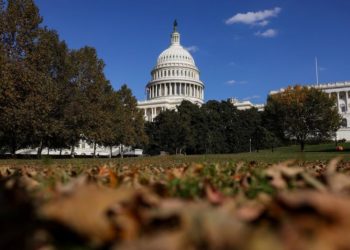The Bureau of Labor Statistics signaled to staff members Monday morning that work would continue as usual at the statistical agency, where President Donald Trump fired the top official Friday over a bleak jobs report.
“Our mission is unchanged – to provide high quality data to the nation,” William Wiatrowski, the agency’s acting commissioner, wrote in an email to all BLS employees obtained by The Washington Post. Wiatrowski was appointed as interim leader Friday.
Trump fired Erika McEntarfer, the top official overseeing employment statistics, after July jobs data showed a major decrease in hiring in the United States and downward revisions on figures from the spring. The move sparked widespread concern among economists and policymakers about the integrity of the data going forward. Trump accused McEntarfer, without evidence, of manipulating closely watched reports for political purposes.
Appointed by President Joe Biden in 2024 for what is usually a four-year term, McEntarfer on Monday wrote her own note to BLS staff members, which Wiatrowski forwarded. In the message, she emphasized the integrity and importance of the agency’s work.
“BLS produces some of the most closely watched economic data in the nation,” she wrote. “Our data moves markets because it is some of the most timely and accurate information on economic conditions that businesses and policymakers have.”
“I sincerely wish my time with you had been longer,” she said.
Trump resumed his attacks on the agency in a Truth Social post Monday, again calling Friday’s jobs report “RIGGED” and adding, with no evidence, that “massive revisions” helped “Radical Left Democrats.” He said he would be picking “an exceptional replacement.”
Trump told reporters Sunday that he would announce a new BLS commissioner “over the next three, four days.”
The BLS is an agency within the Labor Department, with a Senate-confirmed commissioner. McEntarfer was confirmed in an 86-8 bipartisan vote. The agency is independent and produces nonpartisan data on jobs, prices, wages and other topics that is widely utilized, including by the Federal Reserve to set interest rates – as well as the president, Congress and businesses trying to assess the state of the economy.
Former BLS leaders have criticized McEntarfer’s dismissal as unfounded. William Beach, who served as McEntarfer’s predecessor during the Trump administration and into Biden’s term, said the commissioner has no ability to alter the reported data under the current system. The commissioner does not produce the job numbers, nor view them until data is finalized in a report written by career staff members, several former commissioners told The Post.
“He’s making a claim that is just not possible,” Beach said, referring to Trump. “It’s like saying the moon is five miles away. It may look close to you, but it’s much farther away.”
Experts say manipulation of the BLS data for political purposes is possible but unlikely to be undetected. Leaders could infuse political bias into language describing the data to the public. They could delay or speed up the publication of data for political advantage, such as waiting to publish bad news until after an election.
BLS leaders could also manipulate monthly jobs numbers themselves by altering statistical methods used to turn raw survey data into national estimates. But that would be tougher.
“You would have to break many current processes,” said Erica Groshen, who directed the agency under President Barack Obama. The BLS is “set up intentionally so that you don’t get a temptation or ability to do that.”
Katharine Abraham, who led the BLS during the Clinton and George W. Bush administrations, is less worried about Trump appointing a new leader who “rigs the numbers” than she is about how McEntarfer’s firing could erode the “quality of the data.”
Fewer businesses and households respond to the voluntary surveys that are used to gather BLS data if the agency’s legitimacy is in doubt. Declining response rates mean less accurate information for policymaking that affects millions of Americans.
McEntarfer’s removal has also stirred concerns on Wall Street, where analysts and economists warned that such an abrupt shake-up could jeopardize the integrity of the nation’s economic data, potentially undermining sound monetary policy and financial stability. Trump has also been agitating for Fed Chair Jerome H. Powell to cut rates or resign, but experts say the risk of skewing key economic data is as grave as the president’s attacks on the central bank’s independence.
“To borrow from the ‘soft-landing’ analogy, having a flawed instrument panel can be just as dangerous as having an obediently partisan pilot,” JPMorgan Chase’s Michael Feroli noted Sunday.
Rep. Don Bacon (R-Nebraska), a vocal Trump critic who is not seeking reelection, criticized the firing Monday.
“When you start firing people for giving you bad news, then people are hesitant to give you bad news, and then bad things happen,” Bacon told The Post. “We’ve got to work hard to get ground truth.”
McEntarfer’s firing arrived hours after the BLS reported that the job market was far weaker than previously believed. Large cuts to earlier job counts eliminated 258,000 positions originally reported for May and June, marking the steepest two-month downward revision on record outside the pandemic. July figures also fell below expectations, at 73,000 jobs added, highlighting an economy struggling under new tariffs and aggressive immigration restrictions.
Revisions to the jobs reports routinely occur two times after their original publication. Economists said the recent outsize changes from previous months were a reflection of how the government gathers its data. Early versions of the jobs report rely on larger firms that respond quickly, while responses from smaller businesses – often more affected by economic headwinds – filter in later.
As revisions has been added, job totals have been steadily revised downward in recent months, painting a grimmer picture of the labor market than earlier reports suggested. In June, much of the revision was linked to state and local education jobs, for which numbers dropped dramatically after updated data came in.
The revisions Friday were not the first large corrections to BLS data.
A year ago, the agency reported that the U.S. economy had created 818,000 fewer jobs than it had previously reported from April 2023 through March 2024, marking the largest revision to federal jobs data in 15 years.
On the campaign trail at the time, Trump accused Biden and Vice President Kamala Harris of “fraudulently manipulating job statistics to hide the true extent of the economic ruin that they’ve inflicted on America.”
Last year’s massive downward revision was part of the Labor Department’s annual benchmarking process, which compares monthly job estimates with more complete payroll data from state unemployment insurance records.
Economists say that monthly jobs data could be subject to less dramatic revisions with improved response rates from businesses and households. Trump’s firing and attacks on the BLS may discourage the public’s participation in government surveys, experts say.
“If people come to believe that data are all rigged anyway, someone might think, why should I bother responding anyway?” Abraham said.
– – –
Kadia Goba contributed to this report.
Related Content
Pets are being abandoned, surrendered amid Trump’s immigration crackdown
The Post exposed this farmer’s struggle. Then the USDA called.
Kamala Harris will not run for California governor, opening door for 2028 run
The post Labor statistics agency aims to calm furor after Trump fires commissioner appeared first on Washington Post.




